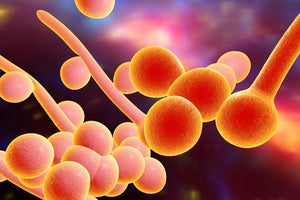Reducing Fungus While Adding Probiotic Bacteria – A New Approach to Fungus Overgrowth?
February 26, 2018

Since Louis Pasteur first performed formal experiments that determined the relationship between bacteria and disease, researchers have learned a significant amount of information regarding the role that harmful pathogens play in the development of diseases. They have found that bacteria living in the gastrointestinal tract, known as the gut microbiota or gut microbiome, have a significant effect on the health of their host. Beneficial bacteria, known as probiotics, can restore bacterial balance in the gut, prevent and treat diarrhea, improve mood, support weight loss, promote immune function and more.
Now some researchers are turning their attention to fungi in the gut and the role it plays in human health. Two recent studies, one in mice and the other in humans, examine the effects of the fungal community living in the gut.
In the rodent study, published in mSphere, researchers discovered that consumption of a high-fat diet caused significant changes to the bacterial composition of the animals’ guts and altered the makeup of the fungal population there. They also found a relationship between the relative numbers of certain groups of fungi and bacteria. Consumption of a high-fat diet significantly disrupted these relationships.
In the human research, published in the medical journal Digestive and Liver Disease, the researchers demonstrated differences bacterial and fungal balances in the gut of people with Crohn’s disease and people without the condition.
High-Fat Diets and Fungus in the Gut
In the mouse study, the research team from the University of Minnesota noted that dietary changes in the host affect the community of fungi living within it. The relationships between bacteria and fungi kingdoms are changing too, as changes in one kingdom affect the community structure and possibly even the functional structure of other kingdoms dwelling in the gut.
While this study is the first to show the specific effects of a high-fat diet on fungi in the gut, known as the mycobiome, previous human studies have shown that changes in diet can modify the fungal communities living in the gut. These studies also link altered fungal populations to intestinal inflammation.
Fungus, Bacteria and Crohn’s Disease
In the human study, scientists investigated the inflammatory influence of fungi in Crohn’s disease, a condition characterized by inflammation and scarring in the intestine.
The researchers compared the bacterial and fungal populations of family members with Crohn’s disease with the microbiome and mycobiome of their healthy relatives. They found that people with Crohn’s had much higher levels of the fungi Candida tropicalis (C. tropicalis) and the two bacteria, Escherichia coli and Serratia marcescens. The scientific team also showed that the three organisms worked together to worsen gut inflammation.
Worse still, fungal species such as C. tropicalis can transform into an even unhealthier fungal form by growing hyphae, which are the thread-like filaments of a fungus that release enzymes to absorb nutrients. Other harmful fungal species, such as C. albicans, work with the bacteria Ruminococcus gnavus to produce enzymes that degrade the mucous membrane in the gut.
This breakthrough study is the first to identify how bacteria and fungi work together to worsen inflammation in Crohn’s disease. The research also highlights the relatively unknown influence that fungi in the gut have on the progression of inflammatory bowel disease (IBD), and has significant implications for future therapies.
Since most research has focused on investigating the role bacteria has on gut health while largely overlooking the part fungus plays, many of the treatments for IBD and other ailments focus almost solely on correcting bacterial imbalances and ignore the benefits of correcting the mycobiome.
One approach would be to consume less fat. Many people are trying ketogenic diets, which is high in fat and low in carbohydrates, in an effort to force their bodies to use up fat stores as fuel. While this diet may promise short-term results, it can have long-term effects on bacterial richness and diversity in the gut. High-fat diets can trigger the growth of Candida parapsilosis, now considered an “emerging major human pathogen” by scientists because it is a leading cause of invasive candidal disease, a type of infection caused by a fungal infection.
Another, more reliable approach to treating the symptoms of IBD and other diseases includes the use of antifungals in conjunction with the use of probiotics. In this combination therapy, the antifungals would control fungi overgrowth while probiotics would help restore and maintain the balance of the gut’s microbiota.
The post Reducing Fungus While Adding Probiotic Bacteria – A New Approach to Fungus Overgrowth? appeared first on Natren Probiotics Blog.





Leave a comment